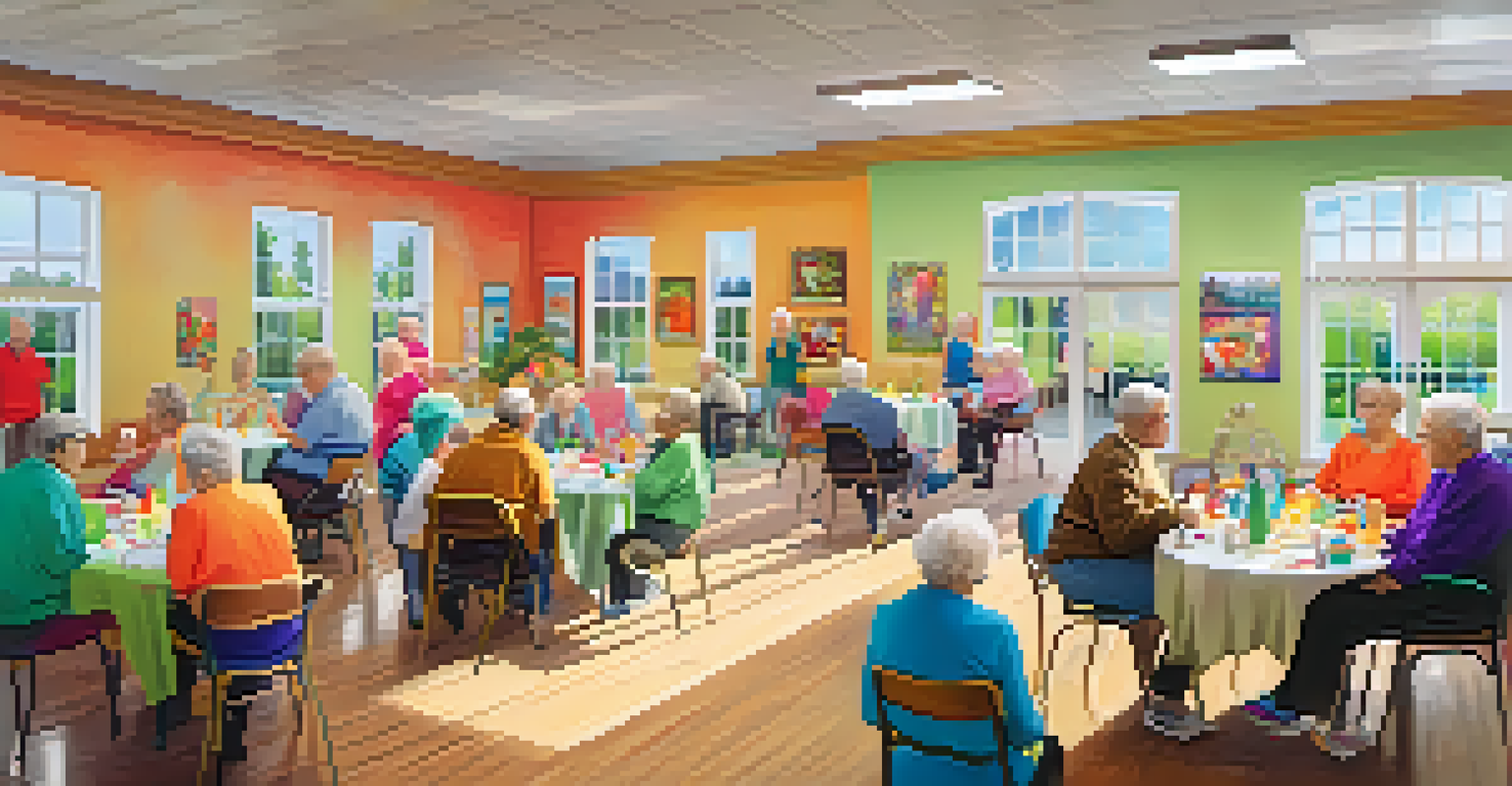Social Isolation and Its Role in Senior Addiction Issues

What is Social Isolation and Why Does it Occur?
Social isolation refers to a lack of social interactions and meaningful relationships, often leaving individuals feeling lonely. For seniors, this situation can arise from various factors such as retirement, the loss of a spouse, or mobility issues that make it hard to engage with others. As friends and family members age or pass away, the social networks that once provided support can dwindle, leading to increased feelings of isolation.
Loneliness can be the most painful experience of all, and yet, it is often the most unrecognized.
This isolation can be exacerbated by health conditions that limit physical activity or by living in remote areas where community engagement is minimal. Without regular social interaction, seniors may struggle to find purpose and fulfillment in their daily lives. Understanding the roots of social isolation is crucial to addressing its impact on addiction.
Ultimately, the absence of social connections can create a void that some seniors attempt to fill through substance use, which can lead to addiction. This highlights the importance of fostering social engagement as a preventative measure against addiction among older adults.
The Link Between Isolation and Substance Abuse
Research shows a significant correlation between social isolation and substance abuse among seniors. When individuals feel disconnected from society, they may turn to alcohol or drugs as a coping mechanism, seeking relief from their loneliness. This behavior can quickly spiral into dependency, especially if the individual lacks a supportive network to help them navigate their challenges.

Moreover, many seniors may not recognize their substance use as a problem, often dismissing it as a way to relax or cope with their situation. This lack of awareness can hinder their willingness to seek help, making it even more critical for family members and friends to stay observant and supportive. Addressing these behaviors early on can prevent the development of more serious addiction issues.
Social Isolation Affects Seniors
Seniors often face social isolation due to factors like retirement and loss of loved ones, leading to feelings of loneliness.
The stigma surrounding addiction can further complicate matters, leaving seniors feeling ashamed or embarrassed to seek help. Creating a supportive environment where open conversations about mental health and substance use can occur is essential in breaking this cycle.
Signs of Addiction in Isolated Seniors
Identifying addiction in seniors can be particularly challenging, especially when social isolation masks the signs. Common indicators include changes in behavior, such as increased secrecy, neglect of personal hygiene, or sudden mood swings. Family members should be vigilant for these signs, as they may signal deeper issues related to substance use.
The greatest gift of life is friendship, and I have received it.
Additionally, physical changes can also provide clues; weight fluctuations, poor health, or unexplained injuries might arise. Seniors may also exhibit confusion or memory problems, which can occur as a result of substance abuse rather than natural aging. Recognizing these symptoms early can lead to timely intervention and support.
Lastly, if a senior begins to withdraw from activities they once enjoyed or stops participating in social gatherings, it’s vital to investigate further. This withdrawal can be both a cause and a consequence of addiction, creating a cycle that may be difficult to break without external assistance.
The Role of Family in Combating Isolation
Family plays a crucial role in addressing social isolation among seniors. Regular visits, phone calls, or video chats can help maintain connections and provide emotional support. Even simple gestures, like sharing a meal or engaging in activities together, can significantly reduce feelings of loneliness and foster a sense of belonging.
Moreover, family members should encourage seniors to participate in community events or social clubs. These activities can introduce them to new friendships and support networks, which are vital for emotional well-being. By actively engaging with seniors, families can help them feel valued and less isolated.
Isolation Linked to Substance Abuse
There is a significant correlation between social isolation and substance abuse in seniors, as they may turn to drugs or alcohol to cope.
Additionally, encouraging open discussions about feelings and mental health can create a safe space for seniors to express their struggles. This dialogue can lead to better understanding and proactive measures to address any potential addiction issues before they escalate.
Community Support: A Lifeline for Seniors
Communities can play a pivotal role in combating social isolation among seniors. Local organizations often offer programs tailored to the needs of older adults, such as fitness classes, art workshops, or support groups. These initiatives can not only provide social interaction but also promote mental and physical health.
Volunteering opportunities can also be beneficial, allowing seniors to contribute to their community while building new relationships. Engaging in meaningful activities can bring a sense of purpose, reducing feelings of isolation and, in turn, the risk of substance abuse. Communities that actively foster inclusivity can significantly enhance the quality of life for their senior residents.
By creating environments that encourage interaction, whether through community centers, online platforms, or local events, we can help seniors find their place within their communities. This connection is essential for their overall mental health and can serve as a buffer against addiction.
Professional Help: When to Seek Assistance
Recognizing when a senior needs professional help can be a delicate matter. If you notice persistent signs of addiction or severe isolation, it may be time to consult a healthcare professional. They can provide a thorough assessment and recommend appropriate treatment options tailored to the individual's needs.
Treatment for addiction often includes therapy, counseling, or support groups that specifically cater to seniors. These programs can offer a safe space for individuals to share their experiences and learn coping strategies. Early intervention is key to preventing further deterioration of health, both mentally and physically.
Family Support is Crucial
Active family engagement can help reduce social isolation among seniors, fostering emotional support and encouraging participation in community activities.
Additionally, involving healthcare providers in discussions about loneliness and addiction can lead to comprehensive care plans that address both issues simultaneously. This holistic approach ensures that seniors receive the support they need to reclaim their lives and break free from the grips of addiction.
Preventing Isolation: Strategies for Longevity
Preventing social isolation requires a proactive approach, both at the individual and community levels. Encouraging seniors to maintain hobbies, pursue interests, and stay active can help them build connections and engage with others. Simple activities, like joining a book club or attending local events, can open doors to new friendships.
Furthermore, technology can be a powerful tool in bridging the gap of isolation. Teaching seniors how to use smartphones, tablets, or computers can help them connect with loved ones and access online communities. Virtual interactions can provide a vital source of social engagement, especially for those with mobility issues.

Finally, fostering an environment of empathy and understanding within families and communities can make a significant difference. By prioritizing social connections and addressing mental health openly, we can create a culture that values the well-being of our seniors, ultimately reducing the risk of addiction.